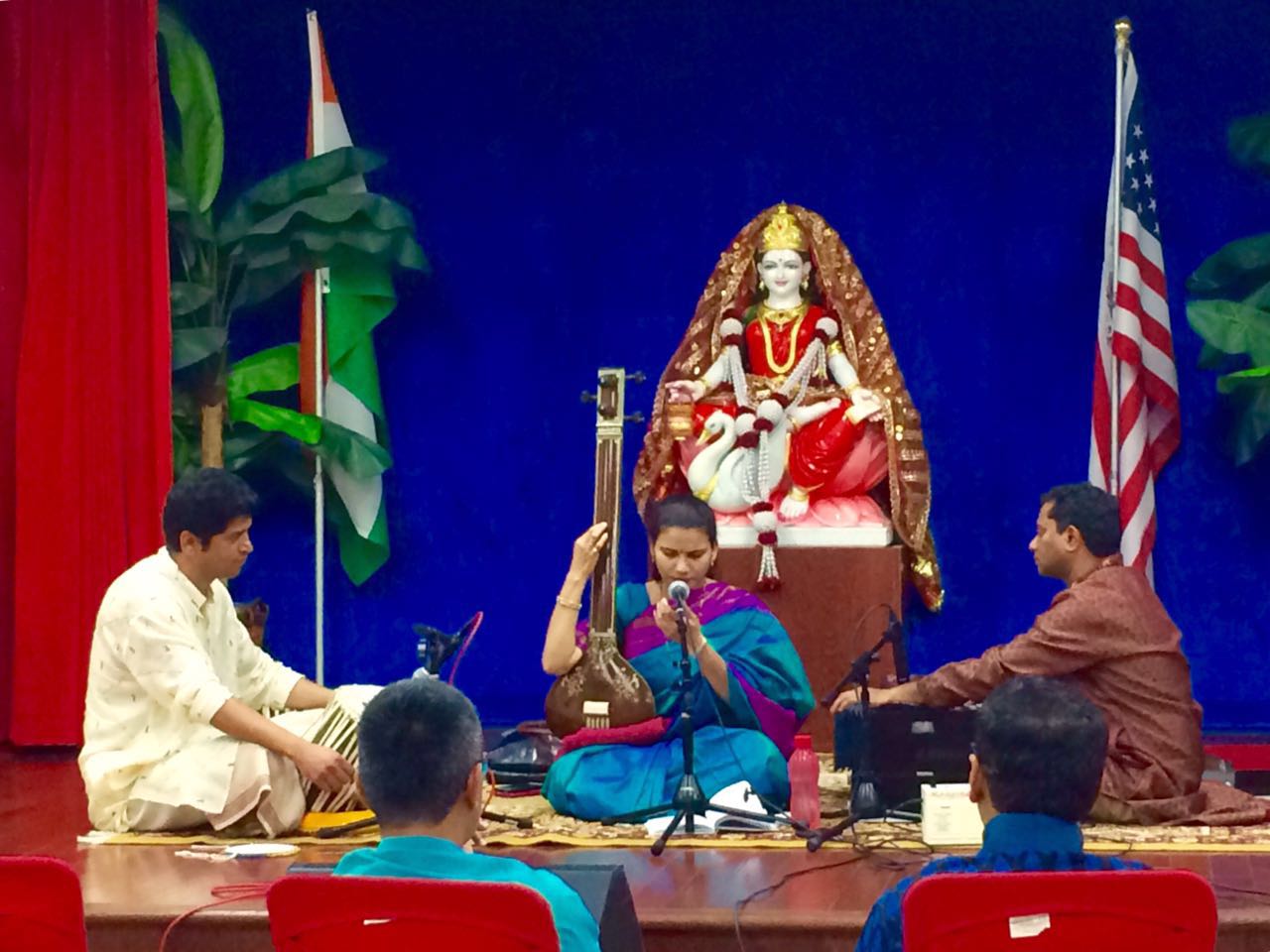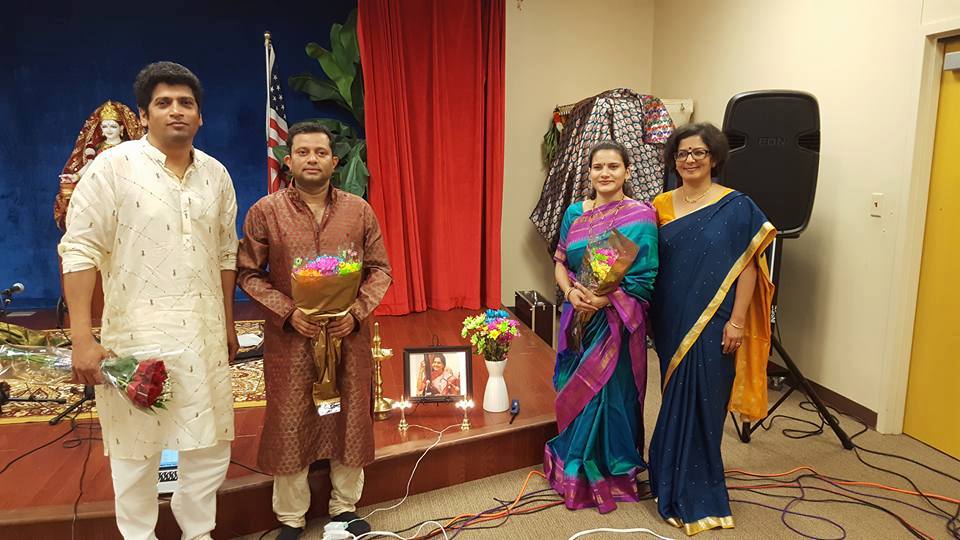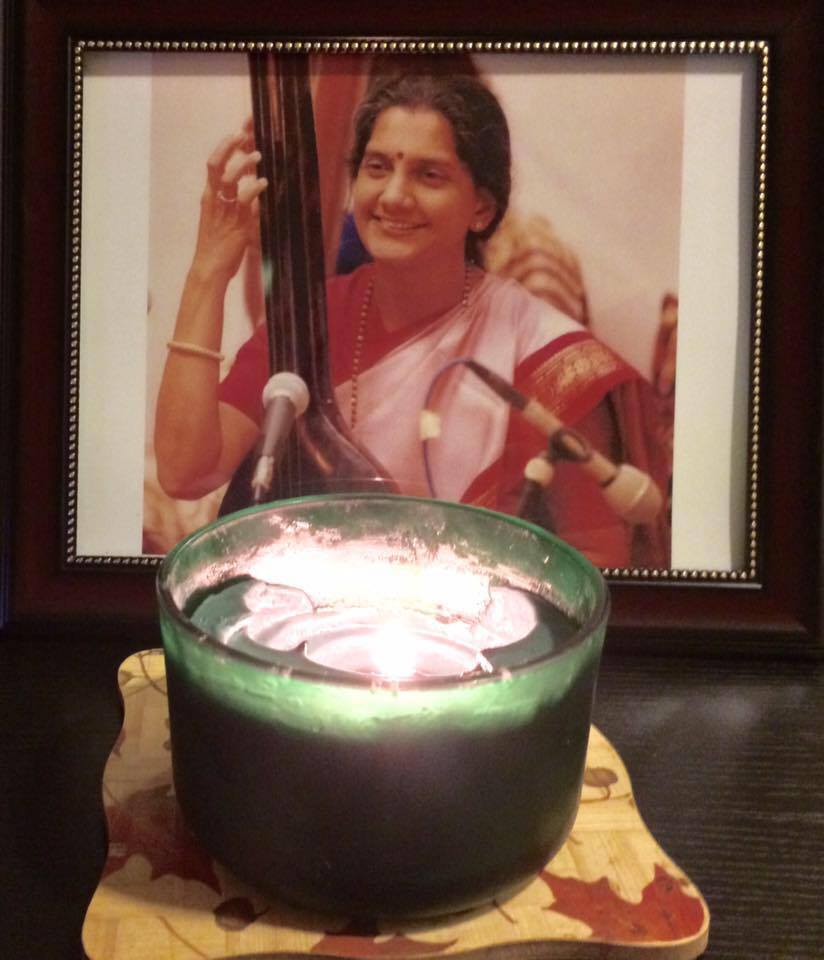Contribute
|
In Conversation With Smt. Rachna Bodas Tribute Music Concert Touches Hearts Of Listeners! |
Shuchita Rao
09/21/2016
Two Boston based musicians, Shri Ramchandra Joshi and Smt. Suraja Menon Roy-Chowdhury, disciples of the renowned Hindustani vocalist, the late Vidushi Dr. Smt. Veena Sahasrabuddhe, organized a morning concert in memory of their Guru at Sai Dwarkamai Temple in Billerica, MA on Sunday September 11, 2016.
Vidushi Smt. Veena Sahasrabuddhe had passed away recently (29th June, 2016) from Parkinson’s disease. Born in a musical family, Veenaji’s early musical education was under the guidance of her father Pandit S.S Bodas, who was himself a disciple of the legendary vocalist Pandit Vishnu Digambar Paluskar. Her musical mentors included her brother, the late Pandit Kashinath Shankar Bodas, Padmashri Balwantrai Bhatt, Pandit Vasant Thakkar and Pandit Gajananrao Joshi. Through the medium of respectful words, live music as well as listening to an archival recording, the special morning concert celebrated the remarkable life and legacy of the exquisite Gwalior gharana artist, gifted composer and dedicated teacher, the late Vidushi Smt. Veena Sahasrabuddhe, who was an inspiration to many aspiring Hindustani classical vocalists including myself.
The tribute concert commenced with a Ganesh Vandana in Raga Ahir Bhairav sung by Smt. Suraja Menon Roy-Chowdhury. Next, Shri Ramchandra Joshi sang a Nirguni bhajan “Ghat ghat mein panchchee bolta, panchchee boltaâ€. The featured artist of the morning concert was a family member and disciple of Dr. Veena Sahasrabuddhe, vocalist Smt. Rachna Bodas. Commencing her recital with with a vilambit (slow tempo) khayal in Raga Ahir Lalit, “Ae Murat albeli, naveli bani nat naagar kiâ€, she followed with a faster tempo chota khayal composed by the late Pandit Balwantrai Bhatt, “So bhavrang rangaya, So aatam anubhav payaâ€. Two taranas that followed in Raga Deshkaar, “Taan derena dim tan dim†(composed by Pt. Kashinath Bodas) and a drut (fast tempo) tarana “Nita tare daani tare daani “ (composed by Pandit Shankar Abhyankar) were rendered with great vigor and succeeded in delighting the listeners in the audience. Rachna Bodas’s recital concluded with two traditional khayals in raga Shuddha Sarang, “Aayi sab deho mubaraki†and “Ab mori baat maan le piharwaâ€. A brisk tarana composed by Pandit Balwantrai Bhatt, “ Dir dir dir tanom tana na†reminded listeners of her Guru, Vidushi Veena Sahasrabuddhe. Smt. Rachna Bodas’s rich and beautiful voice, her sur-lagaav, imagination, gamak-laden forceful taans and complete involvement in unfolding and presenting the morning ragas was divine. The concert ended by a collective listening of a recording of a Bhairavi tarana rendered by Vidushi Smt. Veena Sahasrabuddhe. Many a listener had moist eyes at the end of the program. Her music will be preserved and carried forward by her disciples, a prominent one being Smt. Rachna Bodas.
Lokvani spoke to Smt. Rachna Bodas about her journey in music.
Were you born in a musical family? Were your parents or grandparents musicians?
I was born in a family where music was always around. I grew up listening to all the well-known, renowned maestros of music. My grandfather used to play sitar. My father, Shri. Ravi Shukla is himself an accomplished tabla player and has accompanied distinguished musicians. Though he did not take to playing tabla as a profession, it has been more than just a hobby for him.
At what age did you start singing? Could you name your music teachers and mentors?
I don’t exactly remember what age I started singing. My father saw music in me and he started teaching me bhajans and old Lataji’s songs. He made me participate in various competitions. At the age of 12, I participated in All India light music competition and stood first in that for my age group. It was then that my father thought of me getting formal training. I was very fortunate that Pt. Kashinath Bodas ji agreed to teach me and classical training started from there in1992. I learned for 3 years from him. After Guru ji's sad, unexpected demise, I started my training under his sister Smt. Veena Sahasrabuddhe ji.
Can you describe what you learned under your Guru and father-in-law, Pandit Kashinath Bodasji?
I was introduced to the basics of Hindustani classical music and raagdaari in a very loving manner by Pandit Kashinath Bodasji. I learned sargam-geet, khayal and tarana in ragas such as Yaman, Bhimpalasi, Des and Tilak Kamod. He also taught me bhajans and instilled reverence for music in me.
Tell us more about what you know about Kanpur’s well-known Bodas family. Did you ever meet your grand father-in-law, the influential musician-cum-teacher, the late Pandit S.S. Bodasji?
Since my childhood I was familiar with the Bodas family. Being from Kanpur, I had heard about their contribution and awareness for music. Dadaji, (Pandit S.S Bodasji) invited all the renowned maestros in music who not only performed but also stayed with Bodas family in Kanpur. The same practice was continued by my Guru Pt. Kashinath Bodasji. Unfortunately I never got the opportunity to see or meet my grandfather-in-law as he passed away way before I started learning from my father-in-law. I wish I at-least met him once. I must say that I feel very happy and blessed to have become a part of the Bodas family.
What do you like about your aunt-in-law, the late Vidushi Smt. Veena Sahasrabuddheji’s music?
My Guru and aunt-in-law Smt. Veena Sahasrabuddhe ji’s music is divine. The expression, soulfulness, surilapan, taiyari and the way of looking towards the Ragas and her compositions is what I like about her music.
Would you say that you sing primarily in the style of Gwalior gharana or do you also incorporate features of other gharanas in your music? What would you say are the main characteristics of your khayal gaayaki?
I would say that I sing what my Guru taught me. She never forced or imposed any kind of Gharana on any of her students. My guru Veena Tai developed her own unique style (gaayaki) which has the beauty of Gwalior Gharana and also incorporates aesthetically and artistically the uniqueness of other gharanas.
When it comes to khayal gayaki I would say, as it describes from its name “Khyal†meaning “Imaginationâ€, developing a raag depends on the mood of that raag. I feel it is like a flower bud opening up slowly and reaching to its full blossoming stage. In the same way a raag is unfolded and developed with the imagination of an artist.
Did you make a personal choice to be a full-time professional vocalist?
I received Sangeet Visharad degree from Gandharva Mahavidyalay, Kanpur. Later, I took admission in Centre for performing arts Pune for my masters degree just to be able to get regular music lessons from Veena Tai as she lived in Pune. I think being a full time professional vocalist gradually happened and yes, it was my personal choice.
What are the challenges of staying devoted to performing only classical music? Have you felt the need to explore new avenues such as singing for Kathak dance, doing play-back singing or collaborating with musicians who specialize in musical genres other than Hindustani music?
I would not say that it is a challenge staying devoted to performing only classical music. It is one’s own choice. I feel that all musical genres are branches of classical music. Every music is developed with the same seven notes which we use in classical music. I don’t mind exploring something new if I can give justice to it and it suits me.
How would you describe the word “riyaaz� What is your method of daily riyaaz?
I think riyaaz can be described as ‘sadhana’. It is the most important and integral part of any musician’s life. I follow the method that my Gurus taught me which is the riyaaz of shuddha swaras (regular notes) in mandra (lower), Madhya(middle) and taar(upper) saptak followed by the swaras (notes) of the specific raga that needs to be practiced.
Other than music, what are your interests?
I love to cook. I would say that cooking is a stress-reliever for me. I like to explore cuisines other than Indian such as Mexican and Italian cuisines.
Do you have a grand dream for your life or a personal ambition to fulfill?
I would say that my dream is to carry forward the musical legacy of my gurus and to stay committed to my music with love and devotion.
You may also access this article through our web-site http://www.lokvani.com/
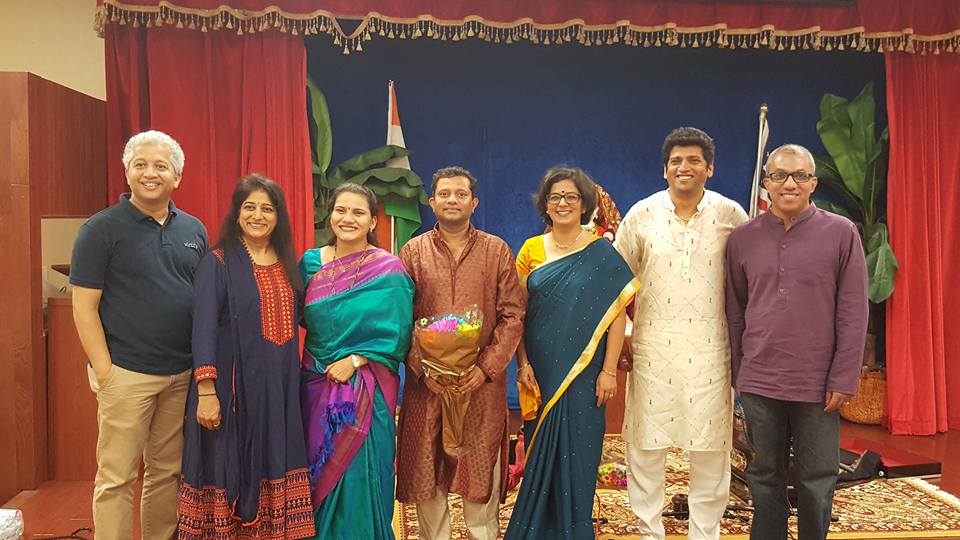
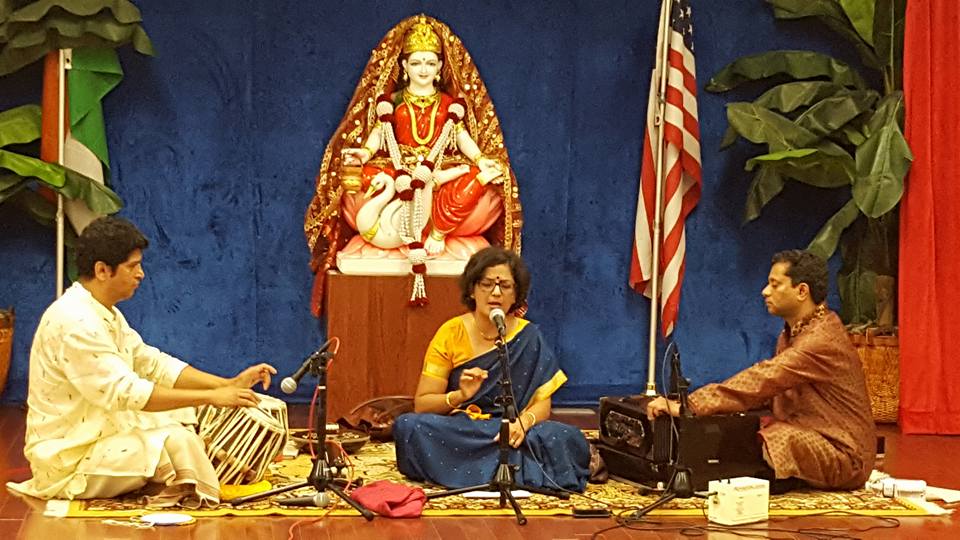
.jpg)
